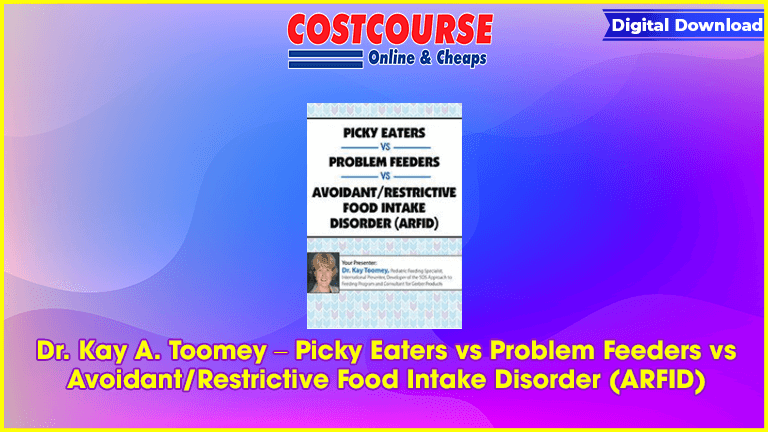Description
Pediatric feeding disorders make it difficult or impossible for a child to eat, drink, or digest food normally, often compromising their health and development.
Dr. Kay A. Toomey – Picky Eaters vs Problem Feeders vs Avoidant/Restrictive Food Intake Disorder (ARFID)
The limited intake seen in these children reflects concern such as:
Food aversions
Lack of interest in eating or food
Avoidance based on sensory characteristics of food
Fear of choking or other adverse consequences
Serious medical and psychological complications consist of
Severe malnutrition
Growth failure
Marked interference with psychosocial functioning
Watch feeding expert, Dr. Kay Toomey, who has over 30 years of clinical experience assessing and treating children with a wide range of feeding challenges. She will show you clear guidelines to utilize the appropriate therapy approach.
Learn practical therapeutic interventions to use with children from each diagnostic group and ways to improve family meal routines and increase children’s intake of more nutritious foods
Identify physical, motor, sensory, oral-motor, environmental, nutritional and behavior factors necessary to consider, to properly assess feeding problems.
Delineate differential criteria for determining a child’s diagnosis as a typical eater, picky eater, problem feeder or a child with ARFID.
Learn when to refer to a specialist for additional treatment.
Change the lives of the children you work with…purchase this recording today!
Handouts
Manual – Picky Eaters vs Problem Feeders vs ARFID (1.9 MB) 115 Pages Available after Purchase Instructions for ASHA credit – Self Study (64.4 KB) Available after Purchase Commission on Dietetic Registration (CDR) Certificate Instructions (163.1 KB) Available after Purchase
Outline
Prevalence of the Problem
Picky eating
Problem feeding
ARFID
The Complexity of Feeding/Eating
7 areas of human function
How children learn to eat (or not)
How to Complete a Comprehensive Feeding Assessment
Medical/organs
Oral-motor skills
Sensory-motor skills
Postural and motor skills
Nutrition
Learning/cognition
Environment
Differential Diagnoses Criteria, Research and Limitations
Picky eating
Able to tolerate new foods on plate
Decreased range or variety of foods that will eat
Frequently eats a different set of foods than the rest of the family
Problem feeding
Restricted range or variety of foods
Refuses entire categories of food textures
Cries and “falls apart†when presented with new foods
ARFID
Accept a limited diet in relation to sensory features
Food refusal is related to aversive or fear-based experiences
Extreme pickiness; distractible and forgetful
Treatment Approaches – Align Treatment w/Diagnosis
Systematic desensitization
Flooding/escape extinction
Eating disorders
Case Studies: When Assessments Go Well, and When They Don’t
Picky eating –
Case 1 = 2 ½ year old male with limited number of accepted foods he will eat, variable eating from one day to the next, issues staying at the table
Case 2 = 2 ½ year old female with restricted food range, over reliance on liquids for calories and swallowing assistance
Case 3 = 9 year, 8 month old male with lack of healthy proteins per parents, and no vegetables in his food range
Problem feeding –
Case 1 = 3 year, 10 month old female with a G-tube, born at 26 weeks gestation, complicated medical history
Case 2 = 4.25 year old female born with congenital Rubella, poor weight gain, restricted food range, episodes of gagging and coughing, episodes of refusing to eat
ARFID –
Case 1 = 15 year old male with chronic “chok-y†sensation, significant weight loss, hospitalized in an Eating Disorders program
Case 2 = 13 year old male with difficulties eating food at school, restricted food range per parental report, refusal to eat vegetables
Practical Feeding Strategies for Pediatric Feeding Disorder
Routines and environmental supports
Matching foods to a child’s skillset
Reinforcement
Management of maladaptive behaviors
When to Refer
Red Flags
Picky Eater vs Problem Feeder criteria
Faculty
Dr. Kay A. Toomey
Toomey & Associates, Inc.
Dr. Kay A. Toomey, is a pediatric psychologist with over 30 years of clinical experience assessing and treating children with a wide range of feeding challenges. She developed the SOS Approach to Feeding as a family-centered program for assessing and treating children with feeding problems. Dr. Toomey helped to form The Children’s Hospital – Denver’s Pediatric Oral Feeding Clinic, as well as the Rose Medical Center’s Pediatric Feeding Center. She also acts as a consultant to Gerber Products.
Dr. Toomey co-chaired the Pediatric Therapy Services Department at Rose Medical Center prior to entering private practice. She acted as the Clinical Director for Toomey & Associates, Inc.’s Feeding Clinic for six years and SOS Feeding Solutions at STAR Institute for eight years, and speaks nationally and internationally about her approach. Dr. Toomey is currently the president of Toomey & Associates, Inc., and acts as a clinical consultant to the Feeding Clinic at STAR Institute.
Speaker Disclosures:
Financial: Kay Toomey is in private practice. She receives a consulting fee from Nestle Infant Nutrition/Gerber division. She receives a speaking fee from Education Resources, Inc.; and SPD Foundation/STAR Institute. Dr. Toomey receives a speaking honorarium from PESI, Inc.
Non-financial: Kay Toomey is a member of Feeding Matters.








